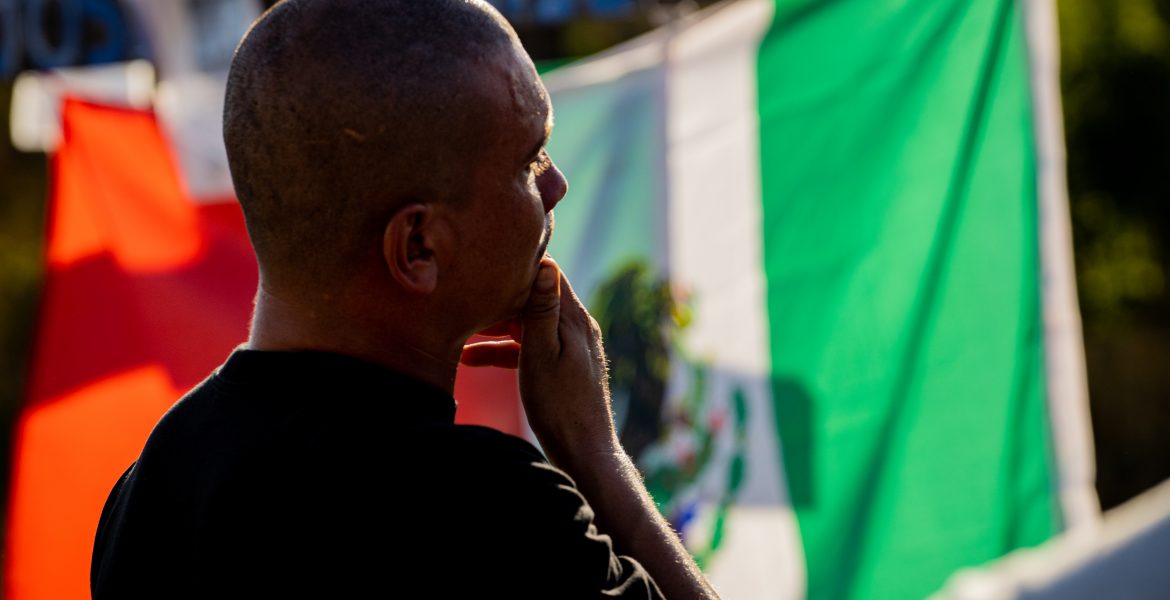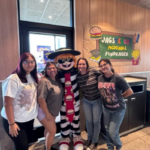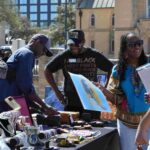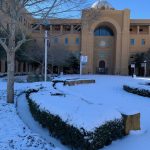The pain and shock is still raw three weeks after 64 migrants were found abandoned in the back of a trailer on a remote backstreet off Quintana road. Extreme heat and asphyxiation resulted in 53 deaths.
San Antonio community members and families from all over Texas are still visiting the site every day and leaving mementos to pay respects to the victims of the deadliest human smuggling case in U.S. history.
Jose Sanchez, 38, originally from Honduras, has been helping maintain the site and organize memorial events. Sanchez, along with his wife and daughter, gives out free water to visitors, coordinates taking donations, and helps arrange rosary events in honor of the migrants.
“I hope to help the people who are grieving,” Sanchez said. “It’s difficult to come to the United States.”
At the site are tall wooden crosses for every person who died, each with their own name painted on and decorated with symbols of their home country. Sanchez said a local Home Depot donated him some of the wood to make the crosses.
At the foot of each cross are flowers, candles, rosaries, and piles of water bottles. Sanchez said the water bottles symbolize the community giving the migrants what they needed most.
“Ponemos el agua por las cruces porque en ese momento eso es lo que necesitaban,” Sanchez said. — [We put the water by the crosses because at that moment that’s what they needed.]
The Bexar County medical examiner’s office has conclusively identified all 53 fatal victims. 26 were Mexican citizens, 21 were Guatemalan citizens, and six were Honduran citizens.
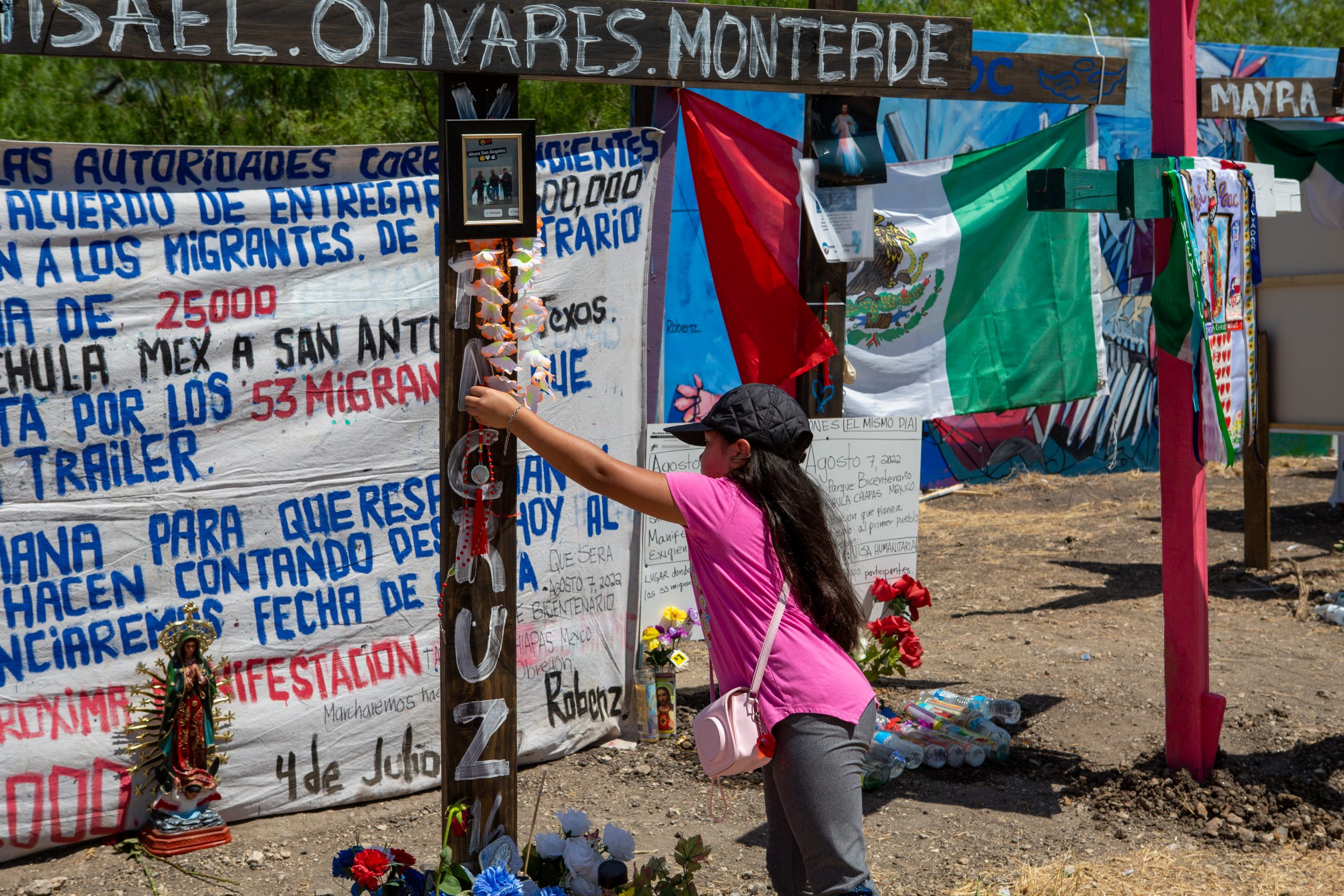
Many visitors are also immigrants from these countries, and they say the pain is personal.
Fabio Alexander Ramirez, 32, moved to the United States from Honduras four years ago and said he visited the site with his family to mourn those with whom he felt he shared a solemn camaraderie.
“Somos migrantes, somos hermanos,” Ramirez said. — [We are migrants, we are brothers.]
Salvador Cervantes, 60, moved from Mexico to the United States 25 years ago. He visited the memorial site with his family to show them the importance of showing up for community.
“Este [es] un ejemplo para toda la gente que venimos de México,” Cervantes said. — [This is an example for all the people who came from Mexico.]
Ignacio Lara, a member of St. Vincent De Paul Catholic Church, has visited every other day to pray over the victims. He says he is proud of the way San Antonians show up for each other during times of crisis.
“San Antonio is so humble,” Lara said. “Especially when it comes to the Hispanic community…we’re all together in the same boat.”
Sandragrace Martinez with Mental Wellness Connections Inc. has been helping organize and promote the rosaries and is at the site in-person Wednesday through Sunday every week. She said seeing how many people show up to pay their respects gives her hope.
“It didn’t take a lot of promoting for people to come together,” Martinez said. “While other people are building walls separating nations, we are building a wall of crosses.”
Martinez said she wants this incident to be a pivot in bringing more resources to migrants in need, especially children and the elderly.
Texas A&M University-San Antonio dreamer peer mentor, who does not wish to be named, said when she first heard about the abandoned trailer, she felt the hurt was personal.
“I was like, ‘no way, this isn’t Texas,’” the mentor said. “And after that, I just felt disgustingly privileged to be where I am.”
The mentor was reminded of her family’s struggle when they immigrated to the United States from Mexico.
“As a daughter of immigrant parents, I hear the story of how my parents came here,” the mentor said. “My mom crossed the border pregnant…I felt grateful for my parents to make it out alive, as well as my brother.”

The mentor also said she wishes immigration to the United States was more accessible and less dangerous, and that the country was more accepting of asylum seekers.
“I wish America was more, like, open to immigrants,” she said. “And I wish we did something about the climate crisis so that even if they were traveling through a trailer, they would have been okay, they wouldn’t have suffered such a slow death, or such a painful death.”
June 2022, when the trailer was abandoned, was San Antonio’s hottest June on record, with 17 days of triple-digit temperatures. Even in such extreme circumstances, people are still willing to risk their life for a chance at a better life in America.
“It’s so bad in other countries that they’d rather, like, risk it all just for, like, a glimpse of what the American dream can be,” the mentor said. “And it’s just like, it’s not an easy choice to leave everything you’ve known, and everyone you love behind.”
The dreamer peer mentor works in the Dreamer Resource Hub on campus, located in modular B, Room 1C.
The office provides guidance and information to DACA recipients, and any student seeking additional help navigating college due to their immigration status. The Dreamer Resource Hub sends out bulk emails to students who have disclosed their status letting them know of the resources available to them.
“If you’re a dreamer student, and you get an email that says dreamers,” the mentor said, “it’s probably from the Dreamer Resource Center. Try to engage with that email.”
The mentor said allyship is strong on campus, and any student who walks into the resource center seeking help with paperwork or just someone to talk to will feel safe.
Ashley Khamtrashyan contributed to this report.
